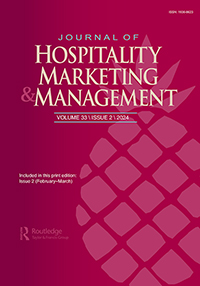Antecedents and consequences of perceived food authenticity: a cognitive appraisal perspective
IF 11
1区 管理学
Q1 BUSINESS
Journal of Hospitality Marketing & Management
Pub Date : 2022-07-27
DOI:10.1080/19368623.2022.2100857
引用次数: 11
Abstract
ABSTRACT Based on cognitive appraisal theory, a theoretical model of the antecedents and consequences of perceived food authenticity is proposed. Specifically, relationships between food-related neophobia and neophilia, emotions, perceived food authenticity, and existential authenticity are evaluated in determining authenticity perceptions. We theorize perceived food authenticity as a four-dimensional construct (local food, traditional food, unfamiliar food, and rare food). Using data collected from international tourists in Iran (N = 339), the findings revealed that positive emotions have the greatest influence on evaluations of perceived food authenticity and existential authenticity. Neophilia rather than neophobia was found to drive perceived food authenticity. The findings contribute to the limited adoption of cognitive appraisal theory in understanding food tourists’ experiences and providing evidence of the role of authenticity evaluation as an outcome of tourists’ affective responses. Managerial insights into differentiated marketing communications for neophiliac and neophobic market segments are provided for food tourism operators and hospitality marketing strategists. 基于认知评价理论,提出了感知食品真实性的前因和后果的理论模型. 具体来说,在确定真实性感知时,评估了与食物相关的新恐惧症和新恐惧症、情绪、感知的食物真实性和存在真实性之间的关系. 我们将感知的食物真实性理论化为一个四维结构 (本地食物、传统食物、陌生食物和稀有食物). 使用从在伊朗的国际游客(N=339)收集的数据,研究结果表明,积极情绪对感知食品真实性和存在真实性的评估影响最大. 研究发现,对食品真实性的感知是由嗜新癖而非恐新癖引起的. 这些发现有助于认知评价理论在理解美食游客体验方面的有限应用,并为真实性评价作为游客情感反应结果的作用提供证据为食品旅游运营商和酒店营销策略师提供了对新癖和新癖细分市场差异化营销传播的管理见解.感知食物真实性的前因和后果:一个认知评价的视角
摘要基于认知评价理论,提出了一种食物真实性感知前因和后果的理论模型。具体而言,在确定真实性感知时,评估了与食物相关的新恐惧症与新癖、情绪、感知食物真实性和存在真实性之间的关系。我们将感知食物真实性理论化为一个四维结构(本地食物、传统食物、不熟悉的食物和稀有食物)。通过对在伊朗旅游的国际游客(N = 339)的数据收集,研究结果表明,积极情绪对感知食物真实性和存在真实性的评价影响最大。研究发现,对新事物的喜爱比对新事物的恐惧更能推动人们对食物真实性的认知。研究结果有助于认知评价理论在理解美食游客体验方面的局限性,并为真实性评价作为游客情感反应结果的作用提供证据。本文为餐饮旅游经营者和酒店营销战略家提供了针对喜爱新事物和厌恶新事物细分市场的差异化营销传播管理见解。基于认知评价理论,提出了感知食品真实性的前因和后果的理论模型. 具体来说,在确定真实性感知时,评估了与食物相关的新恐惧症和新恐惧症、情绪、感知的食物真实性和存在真实性之间的关系. 我们将感知的食物真实性理论化为一个四维结构 (本地食物、传统食物、陌生食物和稀有食物). 使用从在伊朗的国际游客(N = 339)收集的数据,研究结果表明,积极情绪对感知食品真实性和存在真实性的评估影响最大。研究发现,对食品真实性的感知是由嗜新癖而非恐新癖引起的. 这些发现有助于认知评价理论在理解美食游客体验方面的有限应用,并为真实性评价作为游客情感反应结果的作用提供证据为食品旅游运营商和酒店营销策略师提供了对新癖和新癖细分市场差异化营销传播的管理见解.
本文章由计算机程序翻译,如有差异,请以英文原文为准。
求助全文
约1分钟内获得全文
求助全文
来源期刊
CiteScore
20.90
自引率
6.40%
发文量
33
期刊介绍:
The Journal of Hospitality Marketing & Management serves as a peer-reviewed platform dedicated to advancing understanding, practice, and education in hospitality marketing and management. It strives to foster the development of knowledge and theory by promoting new ideas, models, approaches, and paradigms. Embracing a multifaceted approach that spans administrative disciplines, liberal arts, and social sciences, the journal disseminates knowledge through high-quality, peer-reviewed research papers, reports, and book reviews. It stands as a unique forum for the community of students, academics, and practitioners who share a common interest and commitment to the field of hospitality marketing and management.

 求助内容:
求助内容: 应助结果提醒方式:
应助结果提醒方式:


